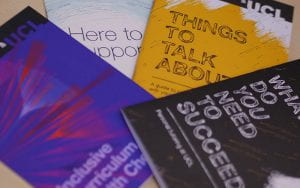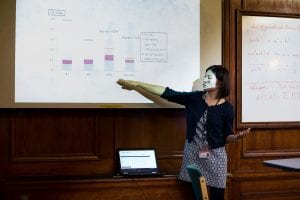UCL Education Strategy: where have we got to and where are we headed?
By ucypasm, on 1 May 2019
It is now three years since we launched the Education Strategy 2016-21. The strategy is underpinned by the belief that during their time at UCL our students should experience directly the world-class research of academics and researchers so that they too understand the uncertainty at the boundaries of knowledge, become knowledge creators themselves, and build the skills they need to excel in their future careers.
Half way through, now is a good point to take stock of what has been achieved and look at what lies ahead for the next two years.
Personalising student support
We have improved how we help new students to settle in and organise their first few weeks. In its first year of operation, the Welcome to UCL app, with checklists for every stage of arrival and details of more than 1405 induction events, was downloaded more than 15,000 times and used by more than 70% of students Our personal tutoring handbooks and digital resources explain the purpose and function of personal tutoring to students and staff, helping them to get the most out of their meetings.
Further work to support the transition to UCL life is underway. The Transition Programme, where small groups of first-year undergraduate students are mentored on all aspects of university life by second years, is being reviewed to create more structured guidance for mentors, with a focus on how to get the most out of lectures and seminars, and how to use assessment and feedback effectively. This autumn we will be piloting our Introductory Programme, a new on-line programme that introduces offer-holders to UCL’s interdisciplinary approach and to new ways of thinking and enables them to explore our campus and connect with other students before they arrive.
 And we are improving the way we support our students once they are here. We’ll be launching the Academic Communication Centre (ACC) in September 2019. The ACC will work directly with students to support their academic writing, and support programme leads to integrate academic writing into the taught curriculum. Later this month we are producing a comprehensive Module Catalogue, a significant step towards a much more positive experience of module choice and registration for students and staff alike. This has been made possible by improvements to our student records system – the result of intense prolonged collaboration between Academic Services and departments.
And we are improving the way we support our students once they are here. We’ll be launching the Academic Communication Centre (ACC) in September 2019. The ACC will work directly with students to support their academic writing, and support programme leads to integrate academic writing into the taught curriculum. Later this month we are producing a comprehensive Module Catalogue, a significant step towards a much more positive experience of module choice and registration for students and staff alike. This has been made possible by improvements to our student records system – the result of intense prolonged collaboration between Academic Services and departments.
Our new Student Success Platform will join up the support we offer to our students: askUCL, a new enquiry management system where staff and students can raise and track enquiries, streamlining referral processes; and a personal tutoring support system that enables staff and students to manage their interactions, arranging and logging meetings and making referrals for specific support. Our new Student Health and Wellbeing Strategy aims to embed a university-wide approach to health and wellbeing so that our students can be successful and enjoy their time at UCL.
We want every student to achieve their full potential so we are working hard to make education at UCL inclusive. Departmental colleagues have been using the Inclusive Curriculum Health Check to identify areas where their programmes and programme delivery could be made more inclusive. And through our BME Attainment Project, we are recruiting and training students to act as consultants to work with staff to develop their curricula with broader representation of thought and approaches, beyond the traditional euro-centric western canon.
Putting research and enquiry at the heart of learning
We introduced the Connected Curriculum, UCL’s framework for integrating a research-based education into all our taught programmes. It is a tool to prompt discussion about curricula to ensure our students get the most from what UCL has to offer. In 2017-18, our departments benchmarked their programmes to find out the extent to which they reflected these dimensions. There is a growing bank of case studies on the UCL Teaching and Learning Portal that showcase the ways in which colleagues are developing the different dimensions of the Connected Curriculum into their modules and programmes.
 There’s been an acceleration in the award of HEA Fellowships, thanks to the work of the Arena Centre for Research-based Education, and earlier this year Anil Doshi from the School of Management was the 1,000th UCL colleague to achieve Fellowship through the Arena Programme. But professional development doesn’t stop there. Every year more than 400 staff attend UCL Education Conference, for a programme packed with presentations by colleagues sharing their innovative practice and research.
There’s been an acceleration in the award of HEA Fellowships, thanks to the work of the Arena Centre for Research-based Education, and earlier this year Anil Doshi from the School of Management was the 1,000th UCL colleague to achieve Fellowship through the Arena Programme. But professional development doesn’t stop there. Every year more than 400 staff attend UCL Education Conference, for a programme packed with presentations by colleagues sharing their innovative practice and research.
Improving assessment and feedback
Our students continue to tell us that the way we are supporting their learning and evaluating their progress needs to get better. There is no silver bullet here and we have been tackling this problem through a number of different initiatives. To ensure fairness and maintain academic standards, we have introduced a single set of academic regulations for all taught programmes, with more supportive progression regulations and clear classification regulations and algorithms. The new regulations support staff to develop and make use of a variety of forms of assessment – we know that diversity in assessment is vital for inclusion. Our Assessment Review continues, and UCL Arena Centre will soon start to work with departments to audit their assessments, using a methodology known as TESTA which has had proven impact elsewhere in the sector. We have also developed more print and online resources to help our students make the most of their assessment and feedback, as well as drawing their attention to processes such as Extenuating Circumstances and Condonement.
 The experience for our students has been improved by the move to a single modern facility at ExcelLondon. Thanks to system and process improvements, the Exam Timetable now has an earlier publication date in February and we have rolled out Late Summer Assessments across the university, so that our students can take deferred exams or resits without having to wait until the following year.
The experience for our students has been improved by the move to a single modern facility at ExcelLondon. Thanks to system and process improvements, the Exam Timetable now has an earlier publication date in February and we have rolled out Late Summer Assessments across the university, so that our students can take deferred exams or resits without having to wait until the following year.
Developing student engagement and leadership
So that we can gather feedback from our students, we have overhauled the student survey cycle, introducing PTES, New to UCL and Student Experience Survey (for penultimate year undergraduates), and dropping the Student Barometer. We are now working on making the results of these surveys accessible through Tableau, so that staff can delve into the data and work out priority areas for improvement. In the three years since its launch, our Student Experience Panel has grown to 1100 active participants, providing another way of gathering student perspectives and feedback on issues outside of their programmes.
UCL ChangeMakers, our scheme that brings students and staff together to work on projects to enhance education within departments, is being scaled up to give students the opportunity to collaborate on projects of institution-wide impact.
Our current Student Voice project is reviewing how student voices shape our decision making and how we can make students more active participants in the process of improvement. Currently there are many different ways in which students are asked to evaluate the modules they have studied. We are scoping a Module Evaluation Platform with a view to harmonise module evaluation across the university, to improve the experience for our students and to provide more useful data and insight.
Preparing students for the workplace and the world
 We have introduced annual careers registration for all undergraduate and postgraduate taught students In the first year, 96% of new and returning students completed careers registration, giving us extremely valuable data, so that we can provide targeted support, reaching those students who would benefit from intensive careers advice at a much earlier stage. So that UCL Careers can give effective support to recent graduates and enhance graduate outcomes, an Exit Survey for graduating students is being developed. In particular, the data will enable us to identify which students are at risk of leaving without having secured their next opportunity.
We have introduced annual careers registration for all undergraduate and postgraduate taught students In the first year, 96% of new and returning students completed careers registration, giving us extremely valuable data, so that we can provide targeted support, reaching those students who would benefit from intensive careers advice at a much earlier stage. So that UCL Careers can give effective support to recent graduates and enhance graduate outcomes, an Exit Survey for graduating students is being developed. In particular, the data will enable us to identify which students are at risk of leaving without having secured their next opportunity.
Our Global Internships Programme encourages UCL students to undertake an international summer internship during their time at university, offering internship opportunities, funding and advice on working overseas.
Enriching digital learning
We have invested £2.5m in audio visual facilities across the campus and continue to enable Lecturecast across our teaching estate. Early adopters of Reflect, our blogging platform for staff and students, are enthusiastic about its potential to enhance teaching and learning.
We keep how we want to teach and learn under constant review so that we can continue to design an online environment to support changing pedagogic and social approaches as well as taking advantage of rapidly advancing technology. We will work closely with academic colleagues to meet increasing demand for good online content to support digital learning. And compliance with new accessibility legislation will ensure that all content on our digital estate is inclusive.
Creating a teaching estate to meet our needs
When we launched the Education Strategy in 2016 there was an acute shortage of teaching and learning spaces that was seriously diminishing the experience for students and staff alike. Three years on there is still much to do but much has been achieved. In 2016-17 alone, we increased the number of study spaces by 15% and through Transforming UCL increased teaching seat capacity by 23%, as well as refurbishing significant buildings such as Bentham House, home to the Faculty of Laws, and creating Wilkins Terrace, a new outdoor social space at the heart of the Bloomsbury Campus.
We have made operational improvements to the timetable and introduced a system that tells students where they can find free study spaces. There is still more work to be done on timetabling but it is possible to see how improved module choice with the new module catalogue, earlier module registration, better systems and higher quality management information will enable us to make much-needed further progress in the medium term.
 A personal highlight has been the recent opening of the Student Centre. Five years in planning and build, this was conceived in partnership with our students and reflects our commitment not only to them, but also to world-class architecture, construction and sustainability. Being really high quality and with students at its heart, it is the physical embodiment of everything that we have been seeking to achieve through the Education Strategy.
A personal highlight has been the recent opening of the Student Centre. Five years in planning and build, this was conceived in partnership with our students and reflects our commitment not only to them, but also to world-class architecture, construction and sustainability. Being really high quality and with students at its heart, it is the physical embodiment of everything that we have been seeking to achieve through the Education Strategy.
Evolving the culture
We have been working hard to raise the status of education at UCL, to secure parity of esteem for the work of our educators and those who support them. In 2018 we introduced the Academic Career Framework, which enables recognition and reward for teaching activity and encourages innovation and education leadership.
So as we enter the next phase of the Education Strategy, thank you to everyone who has helped to get us this far. We are making great progress. The many initiatives to improve and develop our practice, processes, systems and facilities will all help in this next phase, but most of all it will be your continuing dedication to our students that will make the crucial difference. And for that I thank you very much indeed.
 Close
Close





 MyFeedback
MyFeedback
